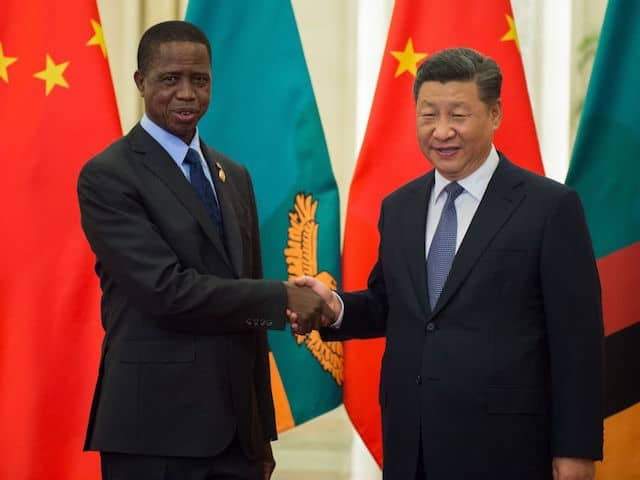Report: Xi Jinping Refused to Cancel Chinese Portion of Zambia’s $10 Billion Debt

Chinese dictator Xi Jinping refused Zambian President Edgar Lungu’s direct request for “debt relief and cancellation” to save the African nation’s spiraling economy in a phone call last week, Kenyan newspaper the Daily Nation revealed on Sunday.
“President Lungu called [Xi] for debt relief and cancellation in light of reduced revenue due to the negative impact of the [Chinese coronavirus] pandemic, as well as competing needs for the country, to secure adequate resources to fight the pandemic and to stimulate the economy,” Lungu’s spokesman, Isaac Chipampe, said on Friday.
Despite Lungu’s personal plea for debt relief, “there was no commitment from Beijing to consider the request,” the Zambian president’s office said in a statement.
“Officials in Beijing have not spoken directly on the Zambian case, except confirming that Zambia and [its capital] Lusaka will continue to cooperate under the Belt and Road Initiative [BRI],” the Daily Nation wrote.
Zambia is one of many African nations heavily indebted to China through its Belt and Road Initiative (BRI), which the Chinese Communist Party (CCP) uses to establish infrastructure-building projects in developing nations funded by predatory loans. The BRI projects serve Beijing by increasing foreign dependence on China and spreading CCP influence across the globe. The initiative’s success – in terms of Beijing’s interests – might be most evident in Africa, where China has become the impoverished continent’s single largest creditor.
Of Zambia’s “more than $10 billion external debt, Lusaka … owes China some $6.4 billion mostly in infrastructure development financed by Chinese lenders,” according to the report.
Zambia is running into “dire straits” on debt repayment, according to a recent analysis by African business risk consultancy firm EXX Africa.
“Last year, Lusaka failed to repay a loan to the Africa Development Bank on time as well as loan repayments to China. Earlier this year, China’s National Complete Engineering Corporation halted work on the $500 million Kafulafuta Dam in the Copperbelt after Lusaka delayed payments due to the Chinese firm,” EXX Africa explained.
“In February [2020], S&P ratings agency lowered its long-term sovereign credit rating on Zambia to ‘CCC’ from ‘CCC+’, warning that the country is vulnerable to non-payment of upcoming commercial obligations,” the study’s authors note. “Lusaka has since borrowed more, but defaulted on payments to an Italian bank, a Russian company, and other Chinese construction firms leading to stalling of projects,” EXX Africa added.
Zambia’s case serves as just one example of the larger African debt crisis, made worse by the ongoing coronavirus pandemic and the economic shutdowns it has caused. Africa’s total debt to China amounts to $145 billion, with over $8 billion in payments owed this year.
In mid-April, international financial institutions such as the World Bank called on wealthy nations to suspend debt payments from the world’s poorest countries, most in Africa, until the end of the year amid increased economic hardship during the pandemic.
China dismissed the call, insisting such a move was “not effective.” Instead, Beijing said it would work with African debtor nations “on the basis of equality and mutual benefit.”
“What China could do to help is bring projects funded by loans back to life and realize sustainable profits, instead of measures as simple as offering write-offs. As always, China is open to talk with debtors on the basis of equality and mutual benefit,” China’s Ministry of Commerce said in a statement. “Simply waiving debtors’ obligations as some countries or organizations have called for is not going to be effective as a solution.”
“In June, President Xi said China would cancel interest-free debt owed by ‘relevant’ African countries as part of Beijing’s move to help the continent during the Covid-19 [Chinese coronavirus] pandemic,” the Daily Nation wrote. “But most of China’s debt is concessional or issued by private entities meaning the credit is harder to forgive.”
“Observers say that while Beijing has, in the past, written off most interest-free loans extended to African nations, they accounted for less than five percent of Africa’s total financial debt to China, with the rest covered by concessional and commercial loans,” the South China Morning Post noted of Xi’s misleading promise.
Photo: NICOLAS ASFOURI/AFP/Getty Images




